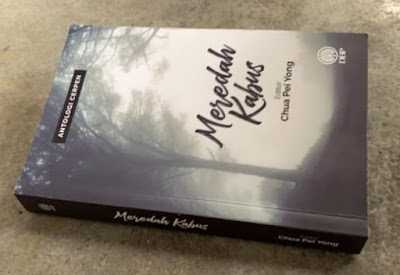While the Tamil community is still arguing on the actual date for the Tamil New Year (January or April), the “Keling” issue is still ongoing, and the polemic over the use of “Allah” is unsettled, it seems there are “silent” movements on the move, undermining the religious rights of non-Muslims in Malaysia.
[Bahasa Malaysia version
– Klik di Sini]
[DBP在想什么?–
Klik di Sini]
This became
clear when I was reading Meredah Kabus
(2021), an anthology of Bahasa Malaysia
short stories published by Dewan Bahasa dan Pustaka (DBP), recently.
I was
saddened and shocked to notice that every time a non-Malay (non-Muslim)
mentions “Tuhan” (God), it is printed as “tuhan” (god). Examples:
Mala juga sentiasa diingatkan untuk berdoa dan berterima kasih kepada tuhan.
(Hlm. 10)
“Demi tuhan,”
tegas Ha Rim. (Hlm. 40)
“Biar tuhan
dan undang-undang saja yang menghukum mereka! (Hlm. 41)
Semoga tuhan
melindungi John daripada sebarang bencana. (Hlm. 63)
Amanah yang diberikan oleh tuhan kepadanya itu yang harus diutamakan.
(Hlm. 99)
Dengan keizinan tuhan, Sangeetha dipertemukan dengan Madam
Ivy. (Hlm. 223)
Letchumi sempat berdoa agar dirinya dilindungi tuhan. (Hlm. 231)
Inilah balasan tuhan terhadap dosa yang aku telah lakukan
terhadap kalian. (Hlm. 236)
Oh, tuhanku!
(Hlm. 251)
Dalam hal Zohra, dia bertambah yakin dengan kuasa tuhan dan karma. (Hlm. 323)
Farid tidak pernah putus mensyukuri rahmat Tuhan. (Hlm. 156)
Appaled by
this, I contacted a few writers and they confirmed that in their original manuscript,
they wrote “Tuhan” but it has been changed to “tuhan” in print.
Personally,
I have faced a similar situation when I was appointed one of the panels to amend
the student edition of the Interlok
novel back in 2011.
Among
others, Kumpulan Sasterawan Kavyan (Kavyan Writers’
Group) requested and demanded “tuhan” in the student
edition of Interlok (2010) to appear
as “Tuhan” in the reprint.
For the
record, in Datuk Abdullah Hussain’s
original version, “Tuhan” is used. But when it was republished as a student
edition, every time a non-Muslim character is involved, “Tuhan” has been
changed to “tuhan”. If the character is a Malay-Muslim, “Tuhan” is used.
When this issue
was highlighted in 2011, some panel members told me bluntly
that if I wanted to use “Tuhan” when it comes to non-Muslims, I had to refer
the matter to the Department of Islamic Development Malaysia (Jakim).
Now, it is
clear to me that not only “Allah” is deemed exclusive for the Muslims. There is
a movement to ensure “Tuhan” (capital) is also exclusively theirs. It seems “Tuhan”
can only be used for Allah.
I see this
as a subversive movement to insult and deny the religious rights of the non-Muslims.
This clearly goes against Article 11
of the Federal Constitution which allows religious freedom.
A quick check of my books, Orang Dimensi (1994), Siru
Kambam (1996), and Surat Dari Madras
(1999) published by DBP shows that “Tuhan” is allowed to be used. But the unwritten
rules seem to have changed gradually.
For
everyone’s note, there is only a single entry for “Tuhan” in Kamus Pelajar (1988). But in Kamus Dewan (2005) and Kamus Dewan Perdana (2020), there are
different definitions for “Tuhan” and “tuhan”.
“Tuhan”
seem to refer exclusively to Allah, whereas “tuhan” refers to “something
worshipped by people whose religion or belief is not based on the One God” (“sesuatu
yang dipuja oleh golongan manusia yang agama atau kepercayaan mereka tidak
berasaskan kepercayaan kepada Tuhan Yang Esa”).
The very
first principle of the Rukun Negara is “Belief in God” (Kepercayaan kepada
Tuhan). Does “Tuhan” in Rukun Negara, which was introduced in 1970 to unite the
nation, refer solely and exclusively to “Allah”?
As a Hindu,
I would like to stress that Hinduism
(Sanatana Dharma) acknowledges One
God under the Eka Aneka concept. Anyone
who doubts this fact should read the Vedas
and Bhagavad Gita.
In Sikhism too, Waheguru is the One
God.
Therefore,
I strongly object and will not give in to any party trying to belittle the
Hindus, Christians, Sikhs, Buddhists etc. It is unconstitutional to say that
the non-Muslims are allowed to use “Tuhan” only if they worship the Muslim God,
“Allah”.
Bahasa
Malaysia as the national language belongs to every Malaysian. Therefore, it
would be unfair for anyone to say that all the words in the Kamus Dewan and Kamus Dewan Perdana has to be seen from the Malay-Muslim
perspective.
If that is
the case, non-Malays and non-Muslims might as well be fully banned for using
the language.
As for the
use of “tuhan” in Meredah Kabus and other books,
I look forward to an unbiased response from DBP. Meanwhile, I urge the general
public – especially non-Muslims – to come forward and voice out their concern
about similar issues. Silence could be perceived as agreeing to adhere to
everything; including the right to use “Tuhan” in one’s own religion.
[Must read – DBP Oblivious to the Change]
[Next – DBP's Flip Flop]
[Update – DBP Becomes Political Stooge]
____________________









